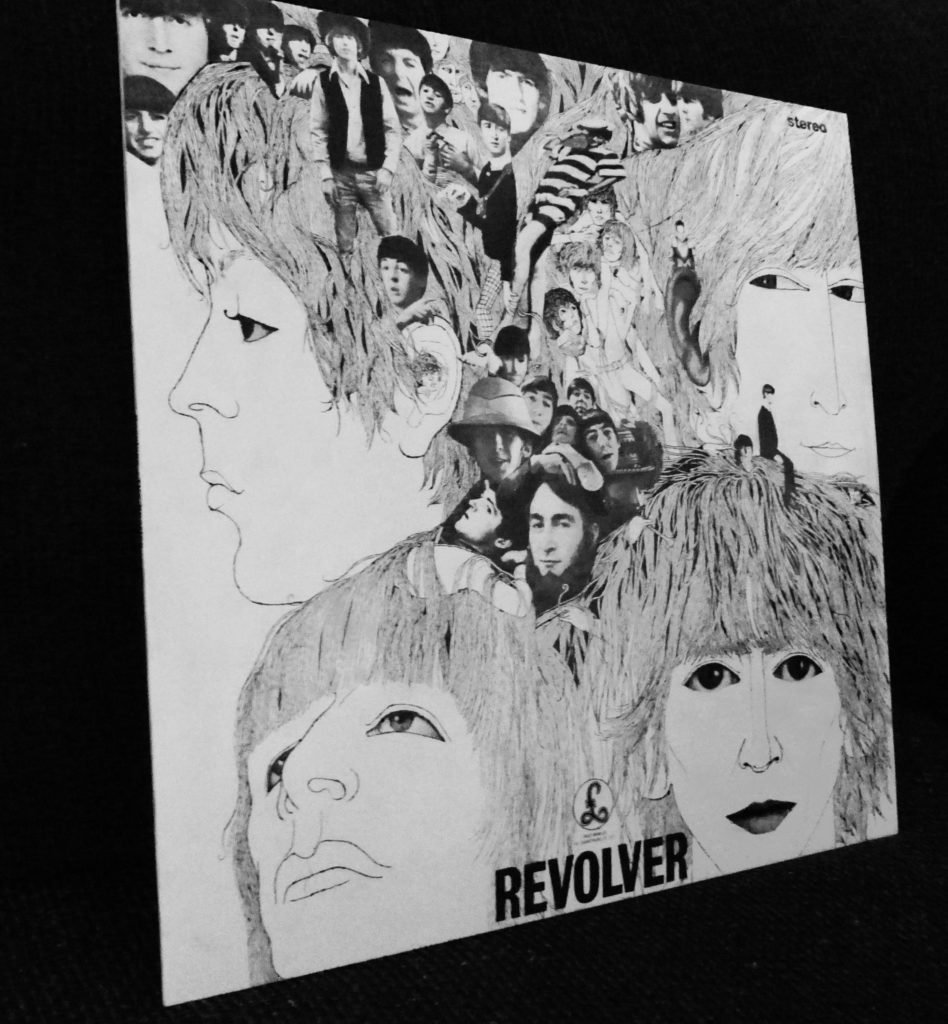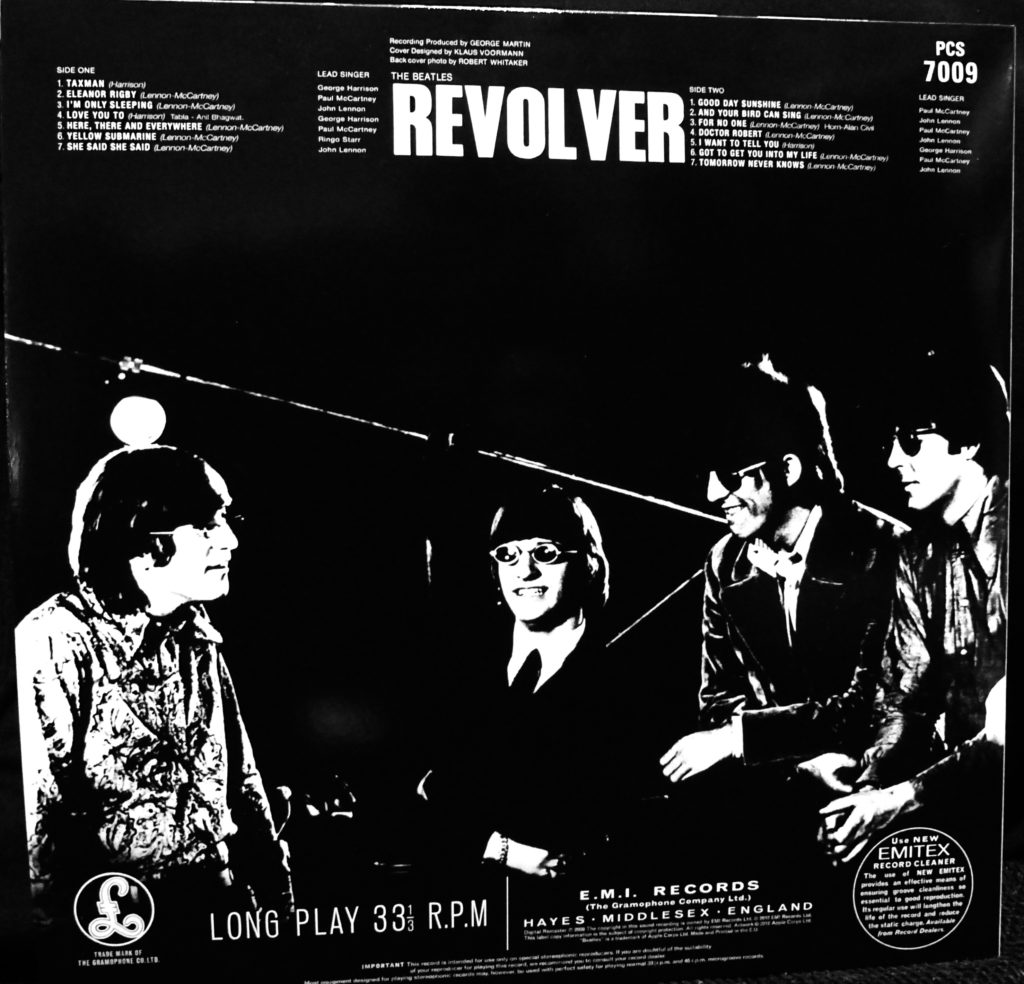In a few days time this landmark album will notch up its 50th birthday and while that milestone might be seen by some as “old” this extraordinary record still sounds fresh to these (ageing) ears. Whether it’s the best album the Fab 4 ever released as many believe is too close to call for me when The Beatles (white album) and Abbey Road are also taken into account. But without a doubt in my mind this is the record where they went from being master craftsmen of music to certified genii.

For while Revolver’s predecessor Rubber Soul saw the Beatles, and more specifically Lennon and McCartney, transition from the pin up princes of pop to become more sophisticated song writers of considerable complexity and depth, it was Revolver that saw them ignite an explosion of creativity and originality of astounding proportions that would change the course of popular music from that moment on. Of course it’s easy now to say this in retrospect, but I can only begin to imagine how the music world reacted to this record when it was unleashed on 5th August 1966. Revolver must have sounded like it had come from another planet and with its arrival killed off the hysterical madness of cute and cuddly Beatle mania for good.
Apparently Brian Epstein was so worried about how fans would take the new material that he was relieved when Klaus Voorman came up with a cover design that built a bridge between the band’s past and its future. The cover is a fantastic piece of pop art – a collage of older photos of John, Paul, George and Ringo residing in their collective psychedelic nest of hair as drawn by Voorman in brilliantly stark black and white.
My copy of the record isn’t an original, but one of those re-released, revitalised and remastered masterpieces – a revolutionised Revolver if you like and all 180 grams of it under the guiding hand of the maestro George Martin. So how does it sound? Like one of the most amazing records of all time really. If this record was being released today for the first time it would still blow most people (not to mention the current crop of pop releases) out of the park. Not bad for an ageing original hipster.
Revolver breaks ground from the opening track with Lennon and McCartney offering the prized poll position to Harrison with his sardonic Taxman. Up until this album Lennon and McCartney had dominated the song writing of the Beatles with Harrison having very limited input, but on Revolver three of his songs were included. From the moment George counts in the song on the LP it sounds like you’re in the studio with the world’s greatest band and you’re on board for the ride. Interestingly the remastered version sticks to the preferred balance of the original with Taxman thumping predominantly through the left channel, but then even George Martin wouldn’t mess with a masterpiece.
As the opening refrain of “ah, look at all the lonely people” backed by the strident string arrangement of Eleanor Rigby kicks in it sounds as vibrant and compelling as it ever did – still one of the Beatles’ most stunning songs. McCartney’s disturbing imagery of a woman “wearing a face that she keeps in a jar by the door” is still haunting 50 years on and by the time Father McKenzie buries Eleanor “wiping the dirt from his hands as he walks from the grave” where “no one was saved” the bleakly sad and lonely existence of their lives has been encapsulated in just over 2 minutes. It’s as close to poetic perfection that pop music has ever come.
I’m Only Sleeping sounds part meditation, part LSD trip hovering somewhere between sleep and consciousness: “please don’t spoil my day I’m miles away” as he “float(s) up stream” – no doubt backwards like Harrison’s guitar. This was the sound of the Beatles experimenting with instruments, sounds, recording techniques, and yes, drugs.
Harrison’s second offering Love You Too is East meets West, led by his interest in the sitar, which first appeared on Rubber Soul’s Norwegian Wood. If Lennon’s mantra was “please don’t wake me, no don’t shake me, leave me where I am, I’m only sleeping”, Harrison’s was to “make love all day long, make love singing songs”. I know who had the better drugs, maybe it was time for Lennon to visit Doctor Robert.
In this newly evolved experimental band it takes five tracks before we get to a conventional love song and it’s one of McCartney’s finest. Here, There And Everywhere was inspired by the Beach Boys’ God Only Knows, which McCartney first heard only weeks before writing this love song. Here, There And Everywhere was cited by both John Lennon and George Martin as one of their favourite Beatle songs, which is more than I can say for the curiosity that is Yellow Submarine – an inventive piece of work with the boys playing around with Studio Two’s sound effects library. Inspired by the madness of the Goons it’s a song that kids (and many adults love), but it’s the one song on Revolver that doesn’t sound like it belongs there. If the Beatles had saved Yellow Submarine exclusively for the animated film released a few years later just think how much better Revolver would have sounded if Paperback Writer or Rain (which were recorded at the same time but only ever released together as a single) had been included instead.
Lennon’s She Said She Said completes side one and features a circular guitar riff by Harrison that sounds more like an eastern stringed instrument. The song continues the themes of death and rebirth that run throughout the album – eastern philosophy or more LSD? Like so much on Revolver the lines are blurred, just as the Beatles intended.

McCartney dominates side two, beginning with the wonderfully joyous Good Day Sunshine. It’s Paul at his whimsical best and it’s a song that can still make you feel good all these years later. John then carries the vibe into And Your Bird Can Sing. Melodically it could almost be a McCartney number (and Paul may well have contributed as they were still collaborating on each other’s songs at that stage), but the acerbic lyric about someone who thinks they have, or know it all, yet they don’t get him is very much Lennon.
For No One is perhaps one of the most underrated tracks on the album. It is essentially a companion piece to Eleanor Rigby in that they are both elegantly sad and gorgeous songs. Both songs convey a world of emptiness, of something long lost and never again to be found: “and in her eyes you see nothing, no sign of love behind the tears, cried for no one”. The brief French horn captures the mood perfectly, but like the relationship itself this poignant piece is over all too soon.
The dubious practices of celebrity New York physician Doctor Robert feature next, followed by George’s third contribution I Want To Tell You. It’s unmistakably a Beatles song, yet it’s also distinctly Harrison, proving that while he may have learnt much from Lennon and McCartney, his contribution and influence to the sound of the Beatles by the time Revolver was released was now well and truly established and that he had emerged as a substantial song writer in his own right.
Got To Get You Into My Life charges in on a blast of horns with a resounding R & B feel. It appears to be a love song, but McCartney is adamant it’s an “ode to pot”. If that’s true it has to be the most buoyant affirmation of hooch I’ve ever heard – regardless it’s a fabulous celebration of living (with weed or otherwise).
Revolver finishes with the astonishing Tomorrow Never Knows – what a head trip! Who needs to take acid when you’ve got this? Technically it was an incredible feat and in all likelihood a nightmare to record – a one off recording with people using pencils to control the loop of the various tapes playing on machines throughout Abbey Road Studios, with each tape feeding to a different fader on the mixing desk. As George Martin said, it could never be duplicated again. God knows what people thought of it when they first heard the song, it is one of the most beguiling and up until that time strangest sounding songs committed to vinyl, yet it still sounds remarkably inventive today. It’s one thing to use a gimmick to create something weird or different just for the sake of it, quite another to reinvent the methodology of production techniques and the notion of what popular music could be.
It’s often said that Revolver’s successor Sgt. Pepper’s Lonely Hearts Club Band was the Beatles’ first concept album, but I disagree. Regardless of whether the Beatles articulated their intent or not Revolver was a concept album through its recurring subject matter (the life/death cycle, alienation/loneliness, isolation/cynical world view); influences (Eastern – musically and philosophically, drugs, the avant-garde movement) and ground-breaking production. Strangely the only single released from the album was the double A side Yellow Submarine/Eleanor Rigby, yet many of the songs on Revolver like Got To Get You Into My Life, And Your Bird Can Sing, Taxman or Good Day Sunshine could easily have been hits. After 50 years it’s as exhilarating as ever.
*Note: in their infinite wisdom EMI have removed virtually all Beatles film clips from the web, preventing their inclusion in this feature (bar one).
Well written, good stuff. A little disappointed there wasn’t a track to listen to like with Ray, and Creedence, while reading. Thanks for knowledge and insight. Love, Marty
Thanks Marty. As I said in the note at the bottom of the Revolver review unfortunately EMI have been pulling down Beatles videos from the web, so I wasn’t able to include any songs in the feature. I suspect it might be because a new Beatles documentary based on their touring years and directed by Ron Howard is about to be released in the next few months – maybe those sinister record company types want to starve us of footage to try and lure more people into seeing the film! Believe me, I’m as disappointed as you are that I couldn’t include any clips in the piece. 🙁
Well Trevor my words would never be good enough for me to express how exceptional and interesting
your comments are by holding my attention and no doubt that of other readers, about the history of
the much loved Beatles and their music.
Congratulations. Cheers from Margaret
Thanks Margaret, that’s very kind of you. Amazing that they still sound so good after all these years – we’ll not see a band as inventive and influential again in our lifetime.